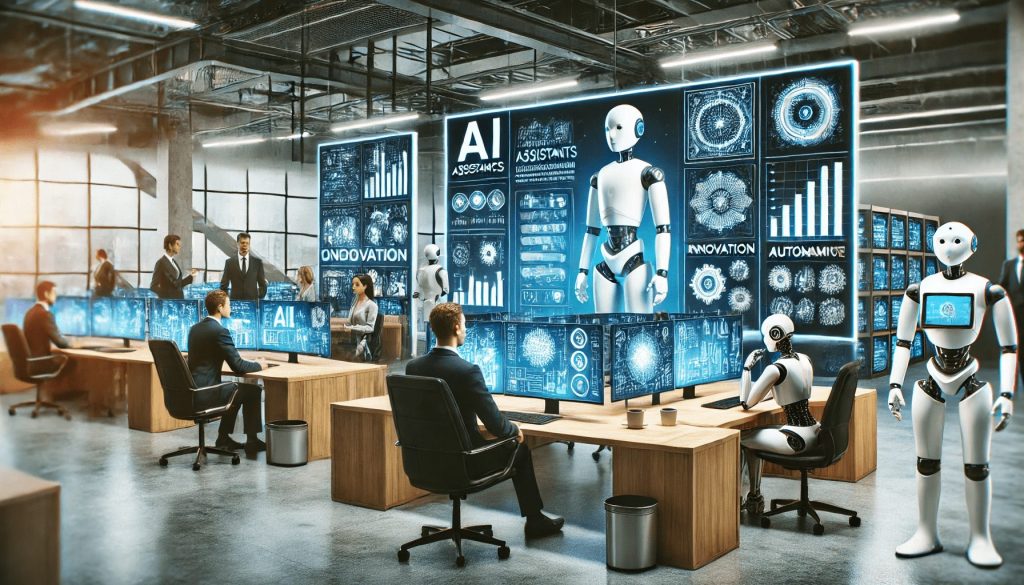Artificial Intelligence is revolutionizing business operations, simplifying and accelerating tasks. AI for business productivity also helps companies by learning and helping them save time, reduce errors, and make better choices. From chatbots answering customer questions to smart tools crunching data, AI has become a part of daily life. Various companies also rely on smart technology marketing tools to generate better ads, comprehend customer behavior, and increase sales. Artificial Intelligence empowers businesses to work smarter, innovate faster, and work ahead of the competition.
Understanding Artificial Intelligence
Artificial intelligence is the imitation of human intelligence processes by machines, especially computer systems. It also helps with problem-solving, decision-making, and automated task performance. AI is being used in a wide range of applications, from voice assistants such as Siri to personalized recommendations when shopping online. We can see the applications of AI in all fields such as healthcare, education, business, and even entertainment. Artificial Intelligence can also be used by people to improve themselves, learn new skills, and make better decisions, leading to personal growth with AI.
Top Benefits Of Artificial Intelligence For Business
Artificial Intelligence is impacting the way businesses function, increasing efficiency and competitiveness. Here are some of the major advantages of AI for business productivity.
Increased Efficiency And Automation
Artificial intelligence automates repetitive operations, minimizing human effort and saving time. Businesses can improve their daily operations by implementing AI-powered chatbots, automated data entry, and smart scheduling.
Better Decision-Making With Data Insights
It immediately analyzes enormous amounts of data, giving important insights that enable businesses to make sound decisions. This leads to a stronger strategy, more positive client experiences, and increased revenues.
Enhanced Customer Experience
Artificial intelligence-powered solutions such as chatbots, virtual assistants, and personalized recommendations enhance customer support. Businesses can reply faster to client inquiries and provide targeted answers.
Cost Savings And Higher Productivity
Artificial intelligence lowers operational expenses and enhances productivity by automating processes. Businesses can achieve more with fewer resources, improving efficiency and profitability.
Smarter Marketing With AI Tools
AI systems are being used to create better marketing campaigns by analyzing customer behavior as well as trends. Marketers are using AI marketing tools more and more. These tools help optimize ads, recommend relevant content, and boost customer engagement.
Improved Security And Fraud Detection
It improves cybersecurity by detecting unauthorized activity, monitoring transactions, and identifying security issues in real-time. This helps organizations avoid data breaches and financial damages.
Personalized Business Strategies
Artificial Intelligence helps companies create personalized products, services, and experiences. It does this by understanding what consumers want and spotting market trends. Customer loyalty and satisfaction increase as a result.
Faster Product Development
By examining consumer demands and market trends, AI expedites research and development. Companies can stay ahead of the competition and develop new products more quickly.
Better Supply Chain Management
Cognitive computing enhances logistics, forecasts demand, and tracks inventory better. Businesses benefit from shorter delivery times, lower expenses, and less waste.
AI-Powered Recruitment And HR Management
AI helps businesses find the best talent by automating interviews, screening resumes, and predicting employee performance. Additionally, it enhances training initiatives and workforce management.
What Is The Future Of AI Technology In Business?
Cognitive computing is changing the operations of businesses and enterprises and will do so in the future as well. Recently, artificial intelligence has played a big role in improving production. It helps create new business strategies and is changing the game in nearly every industry. These are the most significant developments that will define the use of AI in business in the coming years.
Driven Personalization
AI will be used by businesses to give clients highly customized experiences. To provide individualized suggestions, services, and goods, Cognitive computing will examine user behavior, preferences, and previous interactions.
AI in Predictive Maintenance
AI can predict when equipment might fail. This helps manufacturing and industrial companies reduce downtime. This will increase operational effectiveness and reduce.
AI-Powered Legal and Compliance Solutions
AI-Powered Legal and Compliance Solutions By automating contract analysis, risk assessments, and compliance procedures, AI will assist companies in navigating intricate legal and regulatory landscapes while lowering human error and legal expenses.
AI In Financial Forecasting
Businesses will use cognitive computing to assess market risks. It will help them predict financial trends and boost investment returns. Financial modeling powered by AI will enhance profitability and decision-making.
AI In Customer Sentiment Analysis
AI in Customer Sentiment Analysis By examining reviews, social media, and online interactions, smart technology will assist companies in comprehending the feelings and feedback of their customers. This will enable businesses to use real-time customer insights to enhance their goods and services.
Application Of AI In Daily Life
Artificial intelligence applications in daily life are often making life easier for people. Let’s explore how AI is used in everyday activities.
- Virtual Assistants: AI-powered assistants such as Siri, Alexa, and Google Assistant aid with tasks such as creating reminders and answering queries.
- Smart Home Devices: Smart thermostats, security cameras, and voice-controlled appliances all employ AI to automate.
- Personalized Recommendations: Streaming services such as Netflix and Spotify recommend movies and songs based on users’ tastes.
- AI in Healthcare: It helps to diagnose ailments, analyze medical information, and provide virtual health consultations.
- AI in Finance: It assists with fraud detection, online banking security, and personalized investment advice.
- E-commerce and shopping: AI chatbots, virtual shopping assistants, and recommendation engines improve the online buying experience.
- Social media: Smart technology curates material, recommends friends, detects fake news, and improves image recognition.
- AI in Navigation: Google Maps and other GPS apps employ artificial intelligence to give real-time traffic updates and route optimization.
- AI in Education: AI-powered learning apps offer individualized instruction, language translation, and virtual tutoring.
- AI in Automobiles: AI helps self-driving cars, parking assistants, and smart traffic systems.
Conclusion
Smart technology is enabling companies to operate more quickly, intelligently, and effectively. It helps businesses generate new ideas. It saves time by automating tasks. It also improves decision-making with data insights. AI also simplifies marketing and customer support, which results in happier clients. Businesses that use AI will be more successful, save money, and stay ahead of the competition as technology advances. The secret to a more inventive and productive future is the application of AI.
FAQs
AI may be used to automate processes, improve customer service through chatbots, analyze data to make better decisions and optimize marketing and sales strategies.
Popular smart technology tools for beginners include ChatGPT for content generation, Grammarly for writing aid, Canva AI for design, and Google AutoML for simple AI model construction.
AI will increase productivity, automate activities, improve decision-making, and open up new business prospects, allowing organizations to expand quickly.
Advantages: AI boosts productivity, lowers costs, improves customer experience, and strengthens security.
Disadvantages: include high implementation costs, job displacement, data privacy problems, and reliance on technology.
AI can automate customer service. It can also boost marketing and analyze data. This helps businesses make smarter decisions and save on operating costs.




